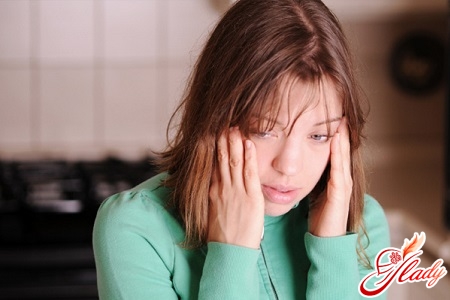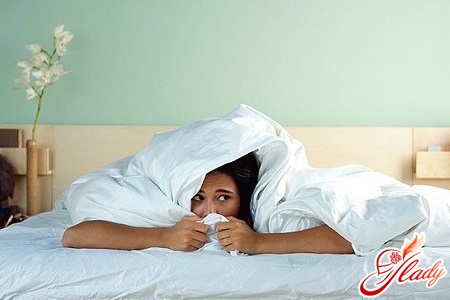 Most likely, you are reading this article now,because you are quite familiar with this feeling - a sense of anxiety and fear, which suddenly and insidiously squeezes you in their grip for no apparent reason. Each of us felt a little uneasy at this or that moment in our life. Someone was worried when they had to solve some problems related to study or work; someone was worried, not knowing how to solve problems in relations with family members, friends or other important people. Each of us is afraid of something: someone, for example, is afraid of spiders, and someone is experiencing a panic fear of heights or enclosed spaces. But these are all worries and fears about something concrete. This is a very unpleasant feeling, but at least we can understand why they arise. But what if you are worried or afraid, but do not understand why? Well, that's just got scary, and that's it! It's scary to go out in the evening. It's scary to be left alone at home. It's just scary when you jump from every rustle like a kangaroo. Or you start worrying, worrying about something, not knowing what you're talking about. That's why this happens to us? Such an unreasonable sense of fear and anxiety interferes with normal life, it is responsible for many, if not most disappointments and failures. In general, anxiety and fear are a normal and natural reaction of the body when we feel threatened or understand that something is not going as it should be. But sometimes the uncertainty of the feeling arises frightens just by its uncertainty, and in some cases a person can not get rid of fear for quite a long time. Why does this feeling arise, how does fear differ from anxiety and how to get rid of them? Let's understand, because if you understand what's happening to you, it will help you overcome your fears.
Most likely, you are reading this article now,because you are quite familiar with this feeling - a sense of anxiety and fear, which suddenly and insidiously squeezes you in their grip for no apparent reason. Each of us felt a little uneasy at this or that moment in our life. Someone was worried when they had to solve some problems related to study or work; someone was worried, not knowing how to solve problems in relations with family members, friends or other important people. Each of us is afraid of something: someone, for example, is afraid of spiders, and someone is experiencing a panic fear of heights or enclosed spaces. But these are all worries and fears about something concrete. This is a very unpleasant feeling, but at least we can understand why they arise. But what if you are worried or afraid, but do not understand why? Well, that's just got scary, and that's it! It's scary to go out in the evening. It's scary to be left alone at home. It's just scary when you jump from every rustle like a kangaroo. Or you start worrying, worrying about something, not knowing what you're talking about. That's why this happens to us? Such an unreasonable sense of fear and anxiety interferes with normal life, it is responsible for many, if not most disappointments and failures. In general, anxiety and fear are a normal and natural reaction of the body when we feel threatened or understand that something is not going as it should be. But sometimes the uncertainty of the feeling arises frightens just by its uncertainty, and in some cases a person can not get rid of fear for quite a long time. Why does this feeling arise, how does fear differ from anxiety and how to get rid of them? Let's understand, because if you understand what's happening to you, it will help you overcome your fears.
Why are we given fear and anxiety?
Most people consider fear and anxiety,as very unpleasant emotions. This is due to the fact that they are often associated with "uncomfortable" bodily sensations, such as heart palpitations, muscle tension, sweating, rushing thoughts, dyspnoea and tunnel vision. But, despite the fact that anxiety and fear can not relate to pleasant feelings, it is impossible to consider them only from a negative point of view. In fact, they serve a very important purpose, and it would be very difficult to live without these emotions. The sense of anxiety and the fear that there is some danger, like all the bodily sensations that arise with fear, are essentially needed to help us respond to this danger. They prepare us for us to run or start fighting. Such an "alarm" exists in people from time immemorial. Our ancestors probably could not survive and as a result become the human race that we have become today, if not for fear and anxiety. Precisely because this "system" has been working for so long, it is so developed. It arises immediately and with minimal effort on our part. We do not even think - if we find ourselves threatened, this response is activated immediately, whether we like it or not. 
What is the difference between fear and anxiety?
Fear and anxiety - similar reactions to each otherto a certain danger. Even the physiological reaction of the organism occurs in the same way. But, with all the apparent similarity, feelings of anxiety and fear also have significant differences:
- Anxiety, excitement and anxiety areAn unpleasant, vague sense of apprehension that arises in response to unclear or unknown threats. For example, imagine that you are walking alone in a poorly lit street. You will surely feel very uncomfortable. This feeling will be connected with the fear, which, in turn, is connected with the possibility that someone can attack you, jumping out of the bushes or from around the corner. In this case, the alarm is not the result of a specific threat. Rather, it comes from seeing our mind a possible danger, which can lead to an unpleasant situation for us. In other words, anxiety most often is pointless and is based only on our assumptions.
- Fear, fear is an emotional reaction tospecific threat. Using the scenario described above, imagine that you are walking along a dark street, someone is approaching you and, threatening with a knife, demands to give away the bag. It is only natural that you will experience fear. The danger is real, concrete and exists right now, becoming a real and clear object of fear.
In general, fear and anxiety are interrelated. Fear causes anxiety, and anxiety can cause fear. But it is the knowledge of the fine lines of difference between these two feelings that will give you a better understanding of the symptoms and can greatly help in dealing with them.
How to treat your fears?
Just because fear and anxietyperform a protective function, this does not mean that they do not harm us. We all have imagination, and sometimes we come up with possible scenarios, which we then involuntarily put into practice. For example, you go on a first date, and at the same time you are very worried that something can go wrong. This can lead to anxiety and fear before the date, and when you meet a young man, your fear will prevent the meeting from going so that the chance for the relationship to develop further. Thus, the natural anxiety of the body can be activated even when there is no real threat, and fear will prevent us from acting in the right direction. For example, when we are afraid that on a date we can not make a desirable impression on a young man, and eventually we can refuse to meet him at all. We are afraid that we will not be able to pass the interview in admission to an interesting and well-paid job - and start looking for a job that is more simple, but uninteresting. Such a choice, dictated by fear, may not have the best effect on our ability to create meaningful positive events in our own lives. In addition, anxiety and fear can not only frighten us with the uncertainty of the future, but also make us inactive in the right direction today. For example, if we are constantly worried that something bad may happen to our children, it can prevent us from truly interacting with them. We will be distracted by unnecessary fuss, and we will not take the time to communicate with them more often. And if we think about something unpleasant that we encountered during the day, while we are in the circle of family or friends, we will lose the chance to really get connected and have fun with them. 
How to overcome your fears and anxieties?
It is difficult to stop these feelings, but, nevertheless, there are many ways to do this. We will show ten ways that will help you cope with a sense of anxiety and fear:
Frequently Asked Questions about Fear
- Why do I feel scared even when I'm not in danger?
We have already spoken with you that fear isThe physiological mechanism that helps us survive. Even if we live today not in caves, but in comfortable, civilized conditions, our brain and body act according to the laws of nature. Such emotions frighten a person primarily because he does not know the reason for their appearance. Now that you know everything, it will be much easier for you to cope with the anxiety.
- What are phobias?
A phobia is a strong fear of some kinda particular thing, animal, situation or place. Anyone who suffers from a phobia should try to avoid contact with the specific cause of his fear or anxiety, because even the very thought of coming into contact with the object of fear can cause severe panic or anxiety. To defeat a phobia can help an experienced specialist-psychologist.
- When is it worth asking for help?
Anxiety and fear affect each of us,regardless of gender, age and cultural level. If you feel that you can not cope with your feelings for several days, weeks or even months, then the trip to the doctor should not be postponed, otherwise emotions will prevail over your life. We advise you to read:









